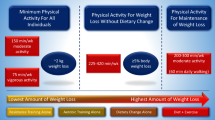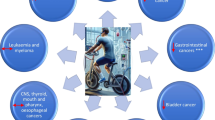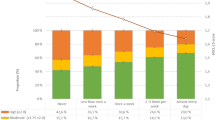Abstract
Introduction
Breast cancer has long-term effects on health-related quality of life (HRQOL) of cancer survivors after treatment. Few research studies have focused on the association between health behaviors and HRQOL of Chinese breast cancer survivors (BCS). The aim of this study was to examine the separate and combined influence of physical exercise, vegetable and fruit intake on health-related quality of life of BCS.
Methods
A cross-sectional study was conducted among BCS from April to July 2013, in Shanghai, China. Data were collected using a self-reported questionnaire, which included questions about basic socio-demographic characteristics, health conditions and treatments, health behaviors and HRQOL. HRQOL was measured using the European Organization for Research and Treatment of Cancer Quality of Life Questionnaire-Core30 (EORTC QLQ-C30) simplified Chinese V3.0 version and the Functional Assessment of Cancer Therapy–General (FACT-G) simplified Chinese 4th version. Multiple linear regression models were performed to estimate the effects of physical exercise, vegetable and fruit intake as well as the effects of health behavior patterns on HRQOL adjusting for potential confounding variables.
Results
Exercisers reported significantly higher scores in most HRQOL dimensions than non-exercisers. Participants who ate more than 250 g of vegetables reported significantly higher scores in most HRQOL dimensions than participants who ate equal or less than 250 g of vegetables. Participants who ate fruit every day reported significantly higher scores in all HRQOL dimensions than those who did not eat fruit every day (P Adjusted ≤ 0.032), except symptom subscales. All subscale scores and total scores of HRQOL, except symptom subscales, were positively associated with the number of adopted healthy lifestyle behaviors (P Trend ≤ 0.003). Compared to participants who adopted only one healthy behavior, participants who adopted two or three healthy behaviors both reported significantly higher HRQOL scores.
Conclusion
Physical exercise, enough vegetable and fruit intake are positively associated with HRQOL of BCS. BCS who adopted several healthy behaviors simultaneously had better HRQOL than one healthy behavior alone. Healthy behaviors, including engagement in exercise, proper diet, especially comprehensive lifestyle behavior interventions, should be valued in improving HRQOL of BCS.

Similar content being viewed by others
References
Jemal, A., Bray, F., Center M M, et al (2011). Global cancer statistics[J]. C CA: A Cancer Journal for Clinicians, 61(2), 69–90.
Zheng, Y., Wu, C., Zhang, M. (2013). The epidemic and characteristics of female breast cancer in China[J]. China Oncology, 23(8), 561–569.
Yang, L., Li, L.-d., & Chen, Y. (2006). Time trends estimates and projects for breast cancer incidence and mortality in China[J]. Chinese Journal of oncology, 6(28), 438–440.
Zheng, Y. (2013). Prevention and control strategies for Chinese female cancer[J]. Chinese Journal of Preventive Medicine, 47(2), 101–104.
Bao, P., Wang, C., Zheng, Y., et al. (2005). Present condition of cancer prevalence in Shanghai[J]. China. Cancer, 14(8), 496–498.
Ganz, P. A., Rowland, J. H., Desmond, K., et al. (1998). Life after breast cancer: Understanding women’s health-related quality of life and sexual functioning[J]. Journal of Clinical Oncology, 16(2), 501–514.
Shockney, L. D. (2010). Pain following breast cancer surgery: A quality-of-life issue[J]. Archives of surgery (Chicago, Ill.: 1960), 145(3), 224–225.
Knobf, M. T. (2007). Psychosocial responses in breast cancer survivors[J]. Seminars in Oncology Nursing, 23(1), 71–83.
Orley J, Kuyken W. (1994). Quality of life assessment: International perspectives. Berlin[C]:Springer-Verlag.
Earle, C. C., & Ganz, P. A. (2012). Cancer survivorship care: Don’t let the perfect be the enemy of the good[J]. Journal of Clinical Oncology, 30(30), 3764–3768.
Nápoles, A. M., Ortíz, C., Santoyo-Olsson, J., et al. (2015). Nuevo amanecer: Results of a randomized controlled trial of a community-based, peer-delivered stress management intervention to improve quality of life in Latinas with breast cancer[J]. American journal of public health, 105(S3), e55–e63.
Victorson, D., Cella, D., Wagner, L., et al. (2007). Measuring quality of life in cancer survivors. Handbook of cancer survivorship[M]. New York: Springer US.
Montazeri, A. (2009). Quality of life data as prognostic indicators of survival in cancer patients: An overview of the literature from 1982 to 2008[J]. Health and Quality of Life Outcomes, 7, 102.
WHO. (2016). WHO Cancer Control Strategy [EB/OL]. http://www.who.int/cancer/media/strategy/en/.
Demark-Wahnefried, W., & Jones, L. W. (2008). Promoting a healthy lifestyle among cancer survivors[J]. Hematology/Oncology Clinics of North America, 22(2), 319–342.
Kim, C. J., Kang, D. H., Smith, B. A., et al. (2006). Cardiopulmonary responses and adherence to exercise in women newly diagnosed with breast cancer undergoing adjuvant therapy[J]. Cancer nursing, 29(2), 156–165.
Chen, X., Zheng, Y., Zheng, W., et al. (2009). The effect of regular exercise on quality of life among breast cancer survivors[J]. American journal of epidemiology, 170(7), 854–862.
Paxton, R. J., Phillips, K. L., Jones, L. A., et al. (2012). Associations among physical activity, body mass index, and health-related quality of life by race/ethnicity in a diverse sample of breast cancer survivors[J]. Cancer, 118(16), 4024–4031.
Wayne, S. J., Baumgartner, K., Baumgartner, R. N., et al. (2006). Diet quality is directly associated with quality of life in breast cancer survivors[J]. Breast Cancer Research and Treatment, 96(3), 227–232.
Mohammadi, S., Sulaiman, S., Koon, P. B., et al. (2013). Association of nutritional status with quality of life in breast cancer survivors[J]. Asian Pacific journal of cancer prevention: APJCP, 14(12), 7749–7755.
Vallance, J. K., Lavallee, C. M., Culos-Reed, N. S., et al. (2012). Physical activity is associated with clinically important differences in health-related quality of life among rural and small-town breast cancer survivors[J]. Supportive Care in Cancer, 20(5), 1079–1087.
Mosher, C. E., Sloane, R., Morey, M. C., et al. (2009). Associations between lifestyle factors and quality of life among older long-term breast, prostate, and colorectal cancer survivors[J]. Cancer, 115(17), 4001–4009.
Thomson, C. A., Stopeck, A. T., Bea, J. W., et al. (2010). Changes in body weight and metabolic indexes in overweight breast cancer survivors enrolled in a randomized trial of low-fat vs. reduced carbohydrate diets[J]. Nutrition and cancer, 62(8), 1142–1152.
Demark-Wahnefried, W., Case, L. D., Blackwell, K., et al. (2008). Results of a diet/exercise feasibility trial to prevent adverse body composition change in breast cancer patients on adjuvant chemotherapy[J]. Clinical breast cancer, 8(1), 70–79.
Chen, Z., Gu, K., Zheng, Y., et al. (2008). The use of complementary and alternative medicine among Chinese women with breast cancer[J]. The Journal of Alternative and Complementary Medicine, 14(8), 1049–1055.
Gong X.-h., Wang J.-w., Yu J.-m. (2013). Progress on instruments measuring quality of life for breast cancer patients [J]. Chinese Journal of Preventive Medicine, 47(7):652–655.
Holzner, B., Bode, R. K., Hahn, E. A., et al. (2006). Equating EORTC QLQ-C30 and FACT-G scores and its use in oncological research[J]. European Journal of Cancer, 42(18), 3169–3177.
Kemmler, G., Holzner, B., Kopp, M., et al. (1999). Comparison of two quality-of-life instruments for cancer patients: the functional assessment of cancer therapy-general and the European Organization for Research and Treatment of Cancer Quality of Life Questionnaire-C30[J]. Journal of Clinical Oncology, 17(9), 2932–2940.
Aaronson, N. K., Ahmedzai, S., Bergman, B., et al. (1993). The European Organization for Research and Treatment of Cancer QLQ-C30: A quality-of-life instrument for use in international clinical trials in oncology[J]. Journal of the National Cancer Institute, 85(5), 365–376.
EORTC. (2001). EORTC QLQ-C30 Scoring Manual[Z]. 3 edition. Brussel.
Cella, D. F., Tulsky, D. S., Gray, G., et al. (1993). The Functional Assessment of Cancer Therapy scale: Development and validation of the general measure[J]. Journal of Clinical Oncology, 11(3), 570–579.
FACT-G. (2013). FACT-G Scoring Guidelines (Version 4)[M/OL]. http://www.facit.org/FACITOrg/Questionnaires.
Mohammadi, S., Sulaiman, S., Koon, P. B., et al. (2013). Impact of healthy eating practices and physical activity on quality of life among breast cancer survivors[J]. Asian Pacific journal of cancer prevention: APJCP, 14(1), 481–487.
Beesley, V. L., Eakin, E. G., Janda, M., et al. (2008). Gynecological cancer survivors’ health behaviors and their associations with quality of life[J]. Cancer causes & control: CCC, 19(7), 775–782.
Demark-Wahnefried, W., Aziz, N. M., Rowland, J. H., et al. (2005). Riding the crest of the teachable moment: promoting long-term health after the diagnosis of cancer[J]. Journal of Clinical Oncology, 23(24), 5814–5830.
Eakin, E. G., Youlden, D. R., Baade, P. D., et al. (2007). Health behaviors of cancer survivors: data from an Australian population-based survey[J]. Cancer causes & control: CCC, 18(8), 881–894.
Caan, B., Sternfeld, B., Gunderson, E., et al. (2005). Life After Cancer Epidemiology (LACE) Study: A cohort of early stage breast cancer survivors (United States)[J]. Cancer causes & control: CCC, 16(5), 545–556.
Broderick, J. M., Hussey, J., Kennedy, M. J., et al. (2013). Testing the ‘teachable moment’ premise: does physical activity increase in the early survivorship phase?[J]. Support Care Cancer, 22(4), 989–997.
Acknowledgements
This study was supported by the National Social Science Grant of China (No. 13CSH076), Shanghai Public Health Key Discipline Plan (Nos. 12GWZX0901, 15GWZK1001). We thank Shanghai Cancer Rehabilitation Club which provided invaluable resources for field investigation. We thank all workers and volunteers involved in the acquisition of data. We are grateful to all involved breast cancer survivors for their open mind to the study and positive attitude to life.
Author information
Authors and Affiliations
Corresponding author
Ethics declarations
Conflict of interest
The authors declare that they have no competing interests.
Rights and permissions
About this article
Cite this article
Gong, XH., Wang, JW., Li, J. et al. Physical exercise, vegetable and fruit intake and health-related quality of life in Chinese breast cancer survivors: a cross-sectional study. Qual Life Res 26, 1541–1550 (2017). https://doi.org/10.1007/s11136-017-1496-6
Accepted:
Published:
Issue Date:
DOI: https://doi.org/10.1007/s11136-017-1496-6




